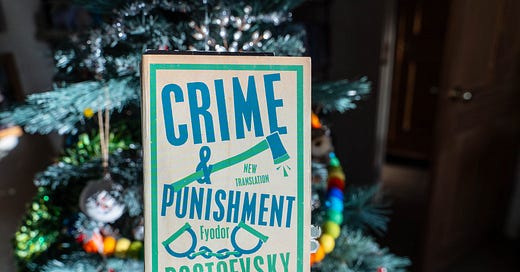Farewell, you unhappy wretch.
Crime and Punishment Week 31: Part Five, Chapter 5
Welcome to Week 31 of my slow-read of Crime and Punishment. This week’s chapter is Part Five, Chapter 5.
Please bookmark the homepage for the read-along. Here, you’ll find links to everything you need as we read the novel together.
If you enjoy this content and would like to help me to keep it going, please consider a paid subscription.
Thank you. 🙏🏻
This week’s characters
(I don’t include Raskolnikov in this listing as he’s in most of the chapters)
Lebezyatnikov • Sonya • Katerina Ivanovna • Svidrigailov
Synopsis
Lebzyatnikov had a worried look. He explains to Rodion about Katerina Ivanovna, how she’s gone to see her late husband’s boss, asking for an audience. She’s teaching her children to sing and dance so they can beg on the streets. Sonya grabs her coat and dashes off.
The chapter moves quickly from here and … spoiler… ends with Katerina Ivanovna’s death. We go through some troubling scenes of her trying to get her children to dance as if in an organ grinder’s performance. Dana has written this up really well on her Substack, so head on over there and read what she’s written about the dances and the history of some of the songs that they’re singing.
Svidrigailov says he’ll pay for the funeral for Katerina and an orphanage for the kids. He’ll also help out Sonya to ‘take her out of that cesspit’. When Rodion asks him why, he says, “So why not simply accept I’m doing it out of the goodness of my heart? After all, she wasn’t ‘a louse.’” This sends a shudder down Rodion’s spine—and ours too. This was the word that Rodion used in the previous chapter in his confession to Sonya, so it’s clear that Svidrigailov was listening.
There’s a call-back to Rodion’s dream about the horse’s being beaten in Part One, Chapter 5, when Katerina shouts:
“Enough!… It’s time… Farewell, you unhappy wretch!… They’ve driven the poor nag to her death.”
There’s a footnote to accompany this passage in the Cockrell translation:
They've driven the poor nag to her death: A clear echo of Raskolnikov's earlier terrible dream. Taken together, this dream and the graphic description of Katerina's death illustrate Dostoevsky's growing conviction that it was atheism, the propensity to "live without God in one's heart", that led directly to man's violent and callous behaviour, whether on a personal or a public level.
Do you agree that these two incidents indicate atheism?
Nietzsche’s famous quote of 1882 that ‘God is dead. God remains dead. And we have killed him.’ was partly influenced by Dostoyevsky. This idea follows on from the Enlightenment, after which God starts to be replaced by science and philosophy and rationalism. It leaves a vacuum that gives rise to nihilism, as represented by Rodion Raskolnikov. But was there not violent and callous behaviour in the before times? Are these behaviours not sometimes carried out in service of religion? I’m just thinking out loud here. Or does that just show man’s flawed understanding of God?
I recently read an interesting article by
about how the tide seems to be turning with regard to the intellectual classes and how some are turning to faith to fill the God-shaped hole.Is this the path that Rodion is on, his road to Damascus? And if so, is redemption available to him?
All quotations in this post are taken from Roger Cockrell’s translation of 2022, Alma Classics, © Roger Cockrell 2022
Translation Points
There’s a Russian idiom here that’s dealt with in numerous different ways. Which do you prefer? A literal translation would be something like ‘tambourines sound better beyond the mountains’.
Russian - Славны бубны за горами!
Garnett - A castle in the air
Coulson - The far-away hills are blue!
McDuff - Green grows the grass far yonder!
P&V - An institute, ha, ha, ha! Castles in Spain!
Ready - That would be nice!
Pasternak Slater - That'll be the day!
Katz - The grass is always greener!
Cockrell - A boarding school, ha, ha, ha! Sheer fantasy!
Head on over to the comparison spreadsheet to see the phrase in context, along with examples from every chapter so far in EIGHT different translations.
Request a Translation Comparison
Paid subscribers may request translation comparisons for anything that jumps out in whichever translation you’re reading.
Once requested, it will be added to the public translation comparison spreadsheet.
Thank you for reading
Thank you for reading with me.
If you enjoy my posts, please consider a paid subscription to support me and this work.
Or if you’d rather just buy me a coffee, I’d be very grateful!








It's always interesting to see which interesting phrase you'll choose for comparison. Here, of course, the results are unusual for me. What's most interesting is P&V's choice to specifically mention castles in Spain. I didn't know there was such an idiom that refers to something distant and pleasant. But Spain really does have beautiful castles, so you can't argue with that.
https://michaelmohr.substack.com/p/the-art-of-existence-by-dostoevsky